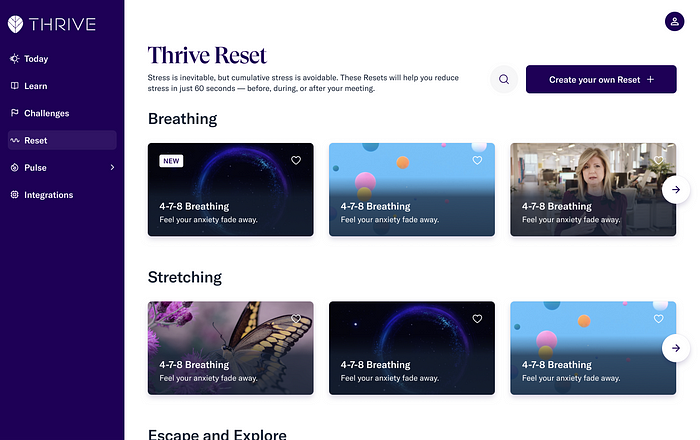Breaking Bread with Arianna Huffington Part II: How A Global Health Crisis Influenced Our ‘New Normal’
Authored by Paul Daversa, Founder & CEO — Daversa Partners

In May of 2020, you were one of Daversa’s very first clients to radically shift mindset and business principles from only hiring in person to hiring geographically and remotely. How has that shaped Thrive and how has it helped sharpen your instincts?
We were already growing quickly coming into 2020, but when the pandemic began, the themes at the heart of our mission — working with less stress and burnout, and prioritizing employee well-being and mental resilience — suddenly became the most urgent workplace issue of our time. So even though much of the world, including Thrive, had gone remote by May, our growth rate was skyrocketing. We had to quickly find new ways to bring talented people to our team. Opening up our hiring geographically allowed us to cast a wider net and exponentially expand our efforts to find people aligned with our mission. Given the fact that the stress and burnout epidemic is global, we’ve always been global from day one. Putting systems in place to hire remotely accelerated that aspect of our mission. Hiring remotely is not without its challenges, but it did sharpen our attention and focus on qualities that are essential to our company culture, like communication, our core value of compassionate directness, and the ability to connect, collaborate and have an ownership mentality.
In March of 2020, there was no way to predict the corporate shift to ‘remote’ or ‘hybrid’ models — what has happened to corporate culture in the last 2 years that will never revert back? Both for better and worse?
More and more companies have realized that in the hybrid world, just as important as organizational design and digital transformation are the hybrid skills we need wherever we’re working. Human skills like empathy, resilience, collaboration and creativity are what allow us to adapt to new environments and constant change — and use all of our other job-specific skills in a sustainable way without burning out.
At the same time, companies are redefining well-being. They no longer see it simply as a perk, a nice-to-have, or an add-on. Instead, they see well-being for what it is: an essential strategy for success.
One task ahead of us as we move into our hybrid future is figuring out how to replace the social capital — our creativity and empathy, our capacity for intimacy and collaboration — that we accrued more naturally in our in-person pre-pandemic world. To do this, companies are coming up with new rituals to nurture that social capital even in distributed workforces. At Thrive, that’s part of the purpose of our Thrive Reset tool. It’s based on the neuroscience that shows that we can course-correct from stress in just 60 to 90 seconds. In addition to choosing from over 100 preloaded Resets to focus on at various points in the day — for instance, gratitude, movement, mindfulness and reframing problems — users can create their own personal Resets with the images, quotes and music that bring them calm and joy. At Thrive, we play a different team member’s personal Reset at the opening of every team meeting. Instead of launching straight into the agenda, we get an intimate glimpse of our colleagues by being brought into their world. The people, the music and the quotes they love. Photographs of places they’ve traveled, cute pets, passions and talents we’d otherwise never know about. Sharing Resets in meetings, within teams or across teams, is a way to break out of the silos of the hybrid world, create moments of serendipity and connection, and build social capital.
Thrive has increased its value by $500M (nearly tripling) in the 24 months since the business world was disrupted by COVID-19. Why? What happened that accelerated the Thrive value proposition?

The short answer is that the problems we offer solutions for suddenly shot to the top of the agenda for nearly every company in the world. As we are seeing with the Great Resignation, there’s a massive culture shift going on in how we think about work. People no longer want to work in a world in which burnout is the price they have to pay for success. And so companies that don’t want to find themselves on the wrong side of the Great Resignation have had to quickly put strategies and solutions in place to empower their employees to succeed and perform without burning out. What they need to do that — and what we offer — are tools that embed well-being into the workflow itself. That’s what we’ve done by integrating Reset into virtual meeting software like Zoom, Cisco Webex and Microsoft Teams for Accenture. With Slack we’re integrating Reset into communications software. And with Genesys, we just launched a partnership to integrate Reset into call center software to reduce stress for customer experience agents.
The pandemic has shattered most corporations’ ability to adapt to the “new normal”…what companies became shapers of the new workforce ? What is different about those companies and their leadership?
I think one common element in companies that have adapted well to a world defined by constant change is that they are led by leaders focused on essential human qualities that build and nurture our resilience. For instance, we’ve recently partnered with Pfizer. Of course, we know all about the success of their Covid vaccine. But as Pfizer CEO Albert Bourla recounts in his new book Moonshot: Inside Pfizer’s Nine-Month Race to Make the Impossible Possible, creating and distributing the vaccines wasn’t just a feat of science. It was also a triumph of Bourla’s leadership, which was laser-focused on the humanity of both his employees tasked with creating the vaccine and of people all over the world who urgently needed it. One thing that comes through in his account is how essential joy was to the effort. In fact, one of Pfizer’s core cultural values is joy, alongside courage, excellence and equity.
Another example is Genesys, which is a leader in cloud customer experience. Our partnership with them — integrating real-time Resets into the contact center software — is an example of what Genesys CEO Tony Bates calls empathy-driven innovation. Bates believes so strongly that empathy is the future of business that he wrote an entire book about it, Empathy in Action.
At Walmart, another of our partners, Chief People Officer Donna Morris has emphasized emotional well-being and resilience, finding ways to embed it in associates’ daily workflow. For example, when the Walmart global people team gathers for team-wide meetings, the sessions begin with a “well-being minute.” This is an opportunity for team members to share what they’re doing to focus on their physical, emotional or financial well-being. It’s inspiring and educational to hear some of the tips and Microsteps helping associates reduce stress and take better care of themselves — whether through short, de-stressing breaks, drinking more water, walking the dog or yoga, meditation and spending quality time with their friends and family. When these tips are shared in the Thrive app, associates inspire each other across the organization and become role models for well-being and resilience.
And at Accenture, which has been a Thrive partner since 2016, CEO Julie Sweet has made employee well-being and mental resilience a priority, with the support of Chief Human Resources Officer Ellyn Shook, Chief Health Officer Dr. Tam Brownlee, and other leaders. Together, we’ve brought Thrive’s platform to Accenture’s global workforce, including our world-class programs Thriving Mind (created in partnership with Stanford Medicine), Thriving Together (about building cultures of resilience and belonging), and Thrive Reset.
So one key element that differentiates companies that are thriving in our current moment is their focus on the human element and the well-being of their employees. That’s what drives both individual and organizational resilience and the ability to navigate constant change and disruption.
The wellness and mental health sector is not a new concept however the entire industry seems to have been turbo charged by the onset of the pandemic. What is the inside talk track you are having with CEOs today and what advice are you giving them?

Employee well-being is what every CEO I meet with now wants to talk about. In those conversations, I no longer have to make the case for well-being. We’re no longer in a “why well-being” world — it was already ebbing, but the pandemic obliterated it. We’re now in the “how” world. CEOs understand the need for employee well-being now. They see the connection between the health of their employees and the health of their bottom line. So I don’t need to show them that part of the deck anymore. They want to skip right to the nuts and bolts solutions. So the advice I offer is based on immediate ways they can embed well-being into their workflow and into company culture.
And of course it’s not just advice, but Thrive’s own solution: our 5×5 product suite. In my conversations with CEOs I hear how much app fatigue there is and how point solutions, while helpful, aren’t enough. That’s why Thrive is offering a whole human solution that embeds well-being directly in people’s workflows. Our 5x5 product suite is a comprehensive set of five distinctive products available across five platforms: web, mobile, chat, conference and call centers. Our goal is to meet the moment by meeting employees where they are and providing solutions in real time when they need them most.
